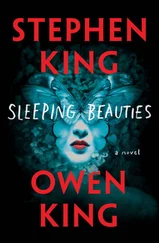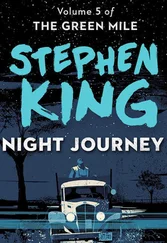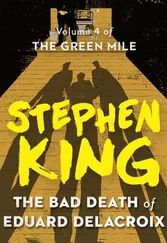Stephen King - Crouch End
Здесь есть возможность читать онлайн «Stephen King - Crouch End» весь текст электронной книги совершенно бесплатно (целиком полную версию без сокращений). В некоторых случаях можно слушать аудио, скачать через торрент в формате fb2 и присутствует краткое содержание. Жанр: Ужасы и Мистика, на английском языке. Описание произведения, (предисловие) а так же отзывы посетителей доступны на портале библиотеки ЛибКат.
- Название:Crouch End
- Автор:
- Жанр:
- Год:неизвестен
- ISBN:нет данных
- Рейтинг книги:4 / 5. Голосов: 2
-
Избранное:Добавить в избранное
- Отзывы:
-
Ваша оценка:
- 80
- 1
- 2
- 3
- 4
- 5
Crouch End: краткое содержание, описание и аннотация
Предлагаем к чтению аннотацию, описание, краткое содержание или предисловие (зависит от того, что написал сам автор книги «Crouch End»). Если вы не нашли необходимую информацию о книге — напишите в комментариях, мы постараемся отыскать её.
Crouch End — читать онлайн бесплатно полную книгу (весь текст) целиком
Ниже представлен текст книги, разбитый по страницам. Система сохранения места последней прочитанной страницы, позволяет с удобством читать онлайн бесплатно книгу «Crouch End», без необходимости каждый раз заново искать на чём Вы остановились. Поставьте закладку, и сможете в любой момент перейти на страницу, на которой закончили чтение.
Интервал:
Закладка:
The cab drew up in front of a dismal-looking restaurant with a small spotted sign in the window reading FULLY LICENSED and a much larger one in the center, which informed that within one, could purchase curries to take away. On the inner ledge there slept a gigantic gray cat. Beside the restaurant was a call box. ’Here you are, guv,’ the cabdriver said. ‘You find your friend’s address and I’ll track him down.’
‘Fair enough,’ Lonnie said, and got out.
Doris sat in the cab for a moment and then also emerged, deciding she felt like stretching her legs. The hot wind was still blowing. It whipped her skirt around her knees and then plastered an old ice-cream wrapper to her shin. She removed it with a grimace of disgust. When she looked up, she was staring directly through the plate-glass window at the big gray torn. It stared back at her, one-eyed and inscrutable. Half of its face had been all but clawed away in some long-ago battle. What remained was a twisted pinkish mass of scar tissue, one milky cataract, and a few tufts of fur.
It miaowed at her silently through the glass.
Feeling a surge of disgust, she went to the call box and peered in through one of the dirty panes. Lonnie made a circle at her with his thumb and forefinger and winked. Then he pushed ten-pence into the slot and talked with someone. He laughed – soundlessly through the glass. Like the cat. She looked over for it, but now the window was empty. In the dimness beyond she could see chairs up on tables and an old man pushing a broom. When she looked back, she saw that Lonnie was jotting something down. He put his pen away, held the paper in his hand – she could see an address was jotted on it – said one or two other things, then hung up and came out. He waggled the address at her in triumph. ‘Okay, that’s th…’ His eyes went past her shoulder and he frowned. ‘Where’s the stupid cab gone?’
She turned around. The taxi had vanished. Where it had stood there was only curbing and a few papers blowing lazily up the gutter. Across the street, two kids were clutching at each other and giggling. Doris noticed that one of them had a deformed hand – it looked more like a claw. She’d thought the National Health was supposed to take care of things like that. The children looked across the street, saw her observing them, and fell into each other’s arms, giggling again. ‘I don’t know,’ Doris said. She felt disoriented and a little stupid. The heat, the constant wind that seemed to blow with no gusts or drops, the almost painted quality of the light… ‘What time was it then?’ Farnham asked suddenly.
‘I don’t know,’ Doris Freeman said, startled out of her recital. ‘Six, I suppose. Maybe twenty past.’
‘I see, go on,’ Farnham said, knowing perfectly well that in August sunset would not have begun – even by the loosest standards – until well past seven. ‘Well, what did he do?’ Lonnie asked, still looking around. It was almost as if he expected his irritation to cause the cab to pop back into view. ‘Just pick up and leave?’
‘Maybe when you put your hand up,’ Doris said, raising her own hand and making the thumb-and-forefinger circle Lonnie had made in the call box, ‘maybe when you did that he thought you were waving him on.’
‘I’d have to wave a long time to send him on with two-fifty on the meter,’ Lonnie grunted, and walked over to the curb. On the other side of Crouch Hill Road, the two small children were still giggling. ‘Hey!’ Lonnie called. ‘You kids!’
‘You an American, sir?’ the boy with the claw-hand called back.
‘Yes,’ Lonnie said, smiling. ‘Did you see the cab over here? Did you see where it went?’
The two children seemed to consider the question. The boy’s companion was a girl of about five with untidy brown braids sticking off in opposite directions. She stepped forward to the opposite curb, formed her hands into a megaphone, and still smiling – she screamed it through her megaphoned hands and her smile – she cried at them: ‘Bugger off, Joe!’
Lonnie’s mouth dropped open.
‘Sir! Sir! Sir!’ the boy screeched, saluting wildly with his deformed hand. Then the two of them took to their heels and fled around the corner and out of sight, leaving only their laughter to echo back.
Lonnie looked at Doris, dumbstruck.
‘I guess some of the kids in Crouch End aren’t too crazy about Americans,’ he said lamely.
She looked around nervously. The street now appeared deserted.
He slipped an arm around her. ‘Well, honey, looks like we hike.’
‘I’m not sure I want to. Those two kids might’ve gone to get their big brothers.’ She laughed to show it was a joke, but there was a shrill quality to the sound. The evening had taken on a surreal quality she didn’t much like. She wished they had stayed at the hotel.
‘Not much else we can do,’ he said. ‘The street’s not exactly overflowing with taxis, is it?’
‘Lonnie, why would the cabdriver leave us here like that? He seemed so nice.’ ‘Don’t have the slightest idea. But John gave me good directions. He lives in a street called Brass End, which is a very minor dead-end street, and he said it wasn’t in the Streetfinder.’ As he talked he was moving her away from the call box, from the restaurant that sold curries to take away, from the now-empty curb. They were walking up Crouch Hill Road again. ‘We take a right onto Hillfield Avenue, left halfway down, then our first right… or was it left? Anyway, onto Petrie Street. Second left is Brass End.’
‘And you remember all that?’
‘I’m a star witness,’ he said bravely, and she just had to laugh. Lonnie had a way of making things seem better.
There was a map of the Crouch End area on the wall of the police station lobby, one considerably more detailed than the one in the London Streetfinder. Farnham approached it and studied it with his hands stuffed into his pockets. The station seemed very quiet now. Vetter was still outside – clearing some of the witchmoss from his brains, one hoped – and Raymond had long since finished with the woman who’d had her purse nicked. Farnham put his finger on the spot where the cabby had most likely let them off (if anything about the woman’s story was to be believed, that was). The route to their friend’s house looked pretty straightforward. Crouch Hill Road to Hillfield Avenue, and then a left onto Vickers Lane followed by a left onto Petrie Street. Brass End, which stuck off from Petrie Street like somebody’s afterthought, was no more than six or eight houses long. About a mile, all told. Even Americans should have been able to walk that far without getting lost. ‘Raymond!’ he called. ‘You still here?’
Sergeant Raymond came in. He had changed into streets and was putting on a light poplin windcheater. ‘Only just, my beardless darling.’
‘Cut it,’ Farnham said, smiling all the same. Raymond frightened him a little. One look at the spooky sod was enough to tell you he was standing a little too close to the fence that ran between the yard of the good guys and that of the villains. There was a twisted white line of scar running like a fat string from the left corner of his mouth almost all the way to his Adam’s apple. He claimed a pickpocket had once nearly cut his throat with a jagged bit of bottle. Claimed that’s why he broke their fingers. Farnham thought that was the shit. He thought Raymond broke their fingers because he liked the sound they made, especially when they popped at the knuckles. ’Got a fag?’ Raymond asked.
Farnham sighed and gave him one. As he lit it he asked, ‘Is there a curry shop on Crouch Hill Road?’
‘Not to my knowledge, my dearest darling,’ Raymond said.
‘That’s what I thought.’
Читать дальшеИнтервал:
Закладка:
Похожие книги на «Crouch End»
Представляем Вашему вниманию похожие книги на «Crouch End» списком для выбора. Мы отобрали схожую по названию и смыслу литературу в надежде предоставить читателям больше вариантов отыскать новые, интересные, ещё непрочитанные произведения.
Обсуждение, отзывы о книге «Crouch End» и просто собственные мнения читателей. Оставьте ваши комментарии, напишите, что Вы думаете о произведении, его смысле или главных героях. Укажите что конкретно понравилось, а что нет, и почему Вы так считаете.











